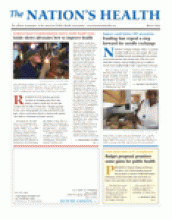Report calls for closing health care work force gap
The United States needs a cohesive approach to current and projected health care work force shortages, modern training of health care professionals across disciplines and distribution of health care professionals to areas of highest need, according to a recent report calling for the issue to be strongly addressed in national health reform.
The report, released in January by the Center for American Progress, recommended creating a permanent work force commission to make specific decisions about the nation’s health work force. Other recommendations included overhauling federal funding for physician training, as the report said the current system does not provide enough support to encourage providers to work in medically under-served communities.
Action is needed, according to the report, because by 2020 there will be a shortage of up to 200,000 physicians and 1 million nurses. Rural Americans and those already living in under-served areas are especially vulnerable to such shortages and are more likely to face problems accessing needed medical and dental care.
The full report, “Closing the Health Care Workforce Gap: Reforming Federal Health Care Workforce Policies to Meet the Needs of the 21st Century,” is available at www.americanprogress.org.
E. coli in food linked to urinary tract infections
Food-borne E. coli, which traditionally is linked to stomach pain and diarrhea, also may have the ability to cause urinary tract infections.
A study in the January issue of Emerging Infectious Diseases found the strain of E. coli in chicken meat and some other foods matched that in people with urinary tract infections, leading researchers to believe the infections may have been caused by food-borne E. coli. The study was based on E. coli samples from women with urinary tract infections in Montreal from June 2005–May 2007, as well as about 400 E. coli samples from fresh, raw retail chicken, beef and pork products from stores in several Canadian provinces. The study also looked at about 75 E. coli samples from restaurants.
Several of the samples taken from the food and the women with urinary tract infections were similar or nearly identical, and some of the urinary tract infections were resistant to many antibiotics.
“This further reinforces the need for responsible antimicrobial drug stewardship in veterinary medicine and food animal production as well as in human medicine,” the study’s authors wrote.
Climate change could impact global mental health
Climate change could have significant impacts on mental health worldwide, but such effects are rarely discussed by those working in mental health research and policy, according to an editorial published online in Psychological Medicine.
Editorial authors said some of the most important health consequences of climate change will affect mental health. Those will include direct effects such as dramatically decreased medical and psychiatric care in the wake of increasing natural disasters, especially for the chronically mentally ill. People with mental illness are particularly vulnerable to heat-related death as well. Evidence also shows suicide may increase as heat becomes extreme, the authors said.
Some indirect consequences of climate change on mental health might include increased flooding that leads to mass migration and a following increased burden of mental illness in affected populations. And as populations continue to drift from rural to urban areas, mental health care access can improve, but such urbanization has also led to an increased incidence of schizophrenia in developed countries, according to the editorial.
The authors pressed for research into mental health and climate change as well as inclusion of mental health concerns in climate change policy.
Melanoma diagnoses increasing, disparities remain
Melanoma is being diagnosed among whites and Hispanics more frequently, while black and Hispanic patients have more advanced cancer at the time of diagnosis.
A study in the December Archives of Dermatology found the rate of new diagnosed melanoma cases rose more than 2 percent each year in the past decade, but that an improvement in diagnosis rates among whites has not translated into earlier detection for other racial and ethnic groups.
The study, based on more than 41,000 cases of melanoma diagnosed from 1990–2004, found 18 percent of “white” Hispanic patients and 26 percent of black patients had cancer that had spread either regionally or to distant parts of their bodies. Twelve percent of white patients had such disease spread.
“Melanoma among darker-skinned populations has received little attention, partly reflecting their overall lower risk compared with white non-Hispanics,” the study’s authors wrote.
The researchers noted that the lowest survival rates and delayed melanoma diagnosis “is often seen in blacks” and that an expanding U.S. Hispanic population and increasing melanoma rates makes detection among all populations “an increasingly important public health issue.”
APHA calls on movie industry to stop smoking
Along with its action-packed scenes, the global blockbuster movie “Avatar” is also delivering an irresponsible message about smoking, said APHA and fellow anti-tobacco advocates in late January.
In a letter to News Corporation Chair and CEO K. Rupert Murdoch, advocates called on the media mogul to “adopt policies and practices that will eliminate smoking and other tobacco imagery…from all News Corporation youth-related films.” The letter, initiated by the Smoke Free Movies coalition, references a scene in the PG-13-rated “Avatar” in which actress Sigourney Weaver demands a cigarette and then proceeds to smoke throughout the rest of the scene. Research has shown that movies are “extraordinarily effective at recruiting new, young smokers,” stated the letter, which also called for an industry-wide standard that eliminates tobacco imagery from youth-related movies.
“For every $100 million Avatar earns at the domestic box office, the film delivers an estimated 40 million tobacco impressions to viewers,” according to the letter. “To date, Avatar has grossed $1.7 billion worldwide.”
For more information on APHA advocacy activities or take action on behalf of public health, visit www.apha.org/advocacy/activities.
- Copyright The Nation’s Health, American Public Health Association









